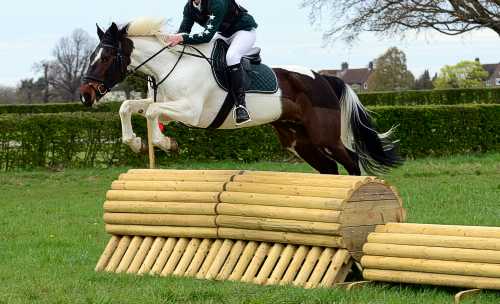
1. Fitness tips
Advice on getting your horse fit for Cross country?
The most crucial thing with fitness is to find a regime appropriate for your horse. Don't just follow a set programme because each horse, even within the same level, needs different work. Get advice from a trainer who knows your horse well and who has practical fitness experience. Take horses cross-country schooling to build up their confidence and their fitness.2. Tackling skinnies
What exercises should you use to improve how you and your horse jump skinny fences?
Do work on skinnies at home in the arena using single fillers and remember they don't have to be tall fillers.
Place poles in a v-shape and approach in trot to start. Trot is an easier pace to control and you can place the horse at a deep take-off spot. Never kick for a long stride at a skinny because it gives a horse too much opportunity to run out.
By regularly doing exercises like this, skinnies become second nature.
3. Warm-up tips
Handy tips for warming up before the cross-country?
Start off by jumping the warm-up fence (begin over the smallest fence) in a straight line a couple of times to
get you horse in the zone.
If you have a corner fence to jump in your course or any angled fences, it is always a good idea to angle your warm-up jump a few times to get your horse’s eye in before you head out across country.
4. Improving straightness
Having problems with running out across country?Work really hard on teaching your horse to stay straight. Using grids at home is the best way to achieve this, but keep them small and easy so his confidence levels are maintained.
When you go schooling begin with straight forward fences, then progress to more complex ones and go back to the easier ones after that to reassure your horse. If he starts running out again, take him back to basics. T
5. How to keep focused
Losing concentration on the approach to fences during cross-country when there are other things to look at?
“It is vital for you as the rider to establish communication with your horse,” says eventing icon Lucinda Green
“Fundamentally, you need to have a ‘stop’ and ‘go’ button — if the horse mucks about, you need to go back to basics until she understands discipline. Focus your horse’s attention on the fence by putting her in what I call ‘the tube’ — wrap your legs around her, imagining your calves are attached to her eyeballs by invisible wire — and locking on to the fence yourself.
“You might have to get tough with your legs and hands to metaphorically say ‘this is where we are going’ but being tough at the wrong moment will take her focus away from the fence on to evading you.”
6. Bringing back confidence
How to rebuild my cross-county confidence?
Keep things simple by spending time perfecting the smaller fences and simpler tracks, which will provide a great
boost..
For example, start with a cross-pole to get going. Consider going back to a lower level to regain some confidence and remember you don’t have to do anything, so remove any expectation of yourself to do things that you aren’t completely confident with. If you don’t want to move up a height or level then don’t.
Relax and have fun. Nobody enjoys being stressed and horses are good at sensing it. Secondly, get out there. Whether it is showjumping, a clinic or local show they are a good way to stay familiar with a competitive atmosphere.”7. Seeing a stride
Worried about your ability to see a bad stride?
The biggest difference between eventing and showjumping is that most eventers ride a rhythm and most showjumpers see a stride. You need to believe in the rhythm and ride strong, instead of worrying about seeing a stride. Make sure your horse is going forward and in front of the leg to give him confidence.
8. Knowing when your horse is ready to event
Starting a youngster
Don't push too much, you have to learn to have fun. There is no need to hurry a youngster — sometimes less is
more.
Make sure that you are always riding positively and use your lower leg to keep his canter engaged. Keeping your hands wide will help him focus and never be tentative on the approach to a fence — he needs to be forward-thinking.
Once you feel your horse is positive and balanced cross-country schooling go and do some hunter trials — but make sure they are well built and the ground is good — before taking him to an affiliated competition. Most importantly, give him time to grow up and enjoy it.
